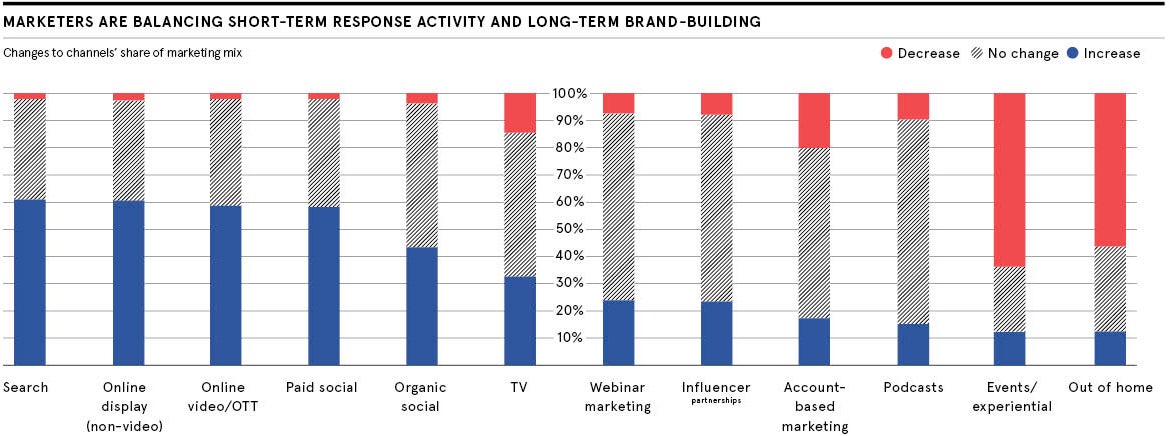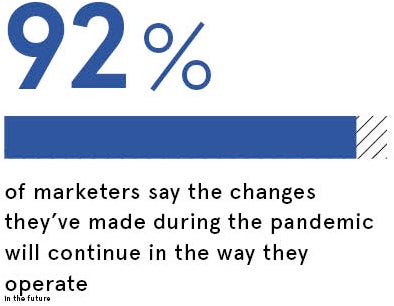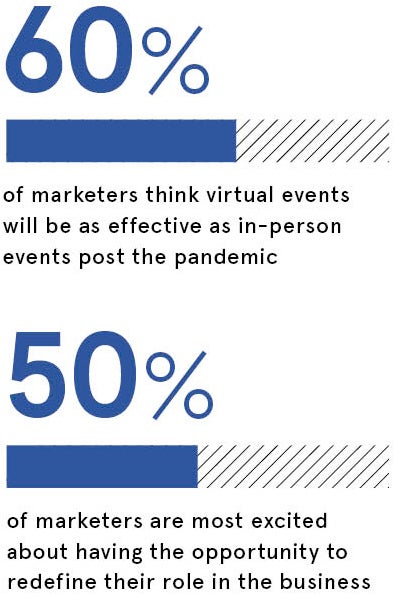SPONSORED BY LinkedIn

01 Amanda Zafiris, Regional Head of Marketing EMEA, WeWork
02 Simon Morris, Senior Director, Digital Media Marketing, Adobe EMEA
03 Joanna Kalenska-Guiridlian, Global Head of Marketing and Client Experience, HSBC Global Asset Management
04 Maor Ezer, Senior Vice President of Marketing, WalkMe
Marketers feel the force of every crisis and 2020 will be one for the history books. The main challenges seen in this unique pandemic year have transcended business-to-business (B2B) and business-to-consumer (B2C) enterprises, though appear to have been somewhat more intense for B2B. A recent study by LinkedIn found that three in four B2B marketers have faced budget cuts, compared with two thirds of their B2C counterparts. Despite this, B2B marketers are more confident in their chances of defending budgets over the next six months.
They are agile, resilient and optimistic for the future, the research found, and in many ways more so than their peers in B2C companies who are reliant on an increase in consumer confidence and spending. Both groups, however, have largely been forced down an unwise path, focusing on the here and now rather than preparing for the recovery that is sure to follow. Success will require a savvy focus on brand investment.
More than a third of the marketers surveyed by LinkedIn said they are less able to take risks with campaigns due to budget constraints and half said they will focus more on tactical execution than strategic projects over the coming year. While the tendency to submit to short-termism in an uncertain landscape is understandable, analysis of past recessions suggests more successful marketers commit to long-term brand advertising.
“This is because the key benefit is felt later, during recovery, when markets are rebounding and the returns on that investment will be much greater,” says Peter Field, an independent marketing and advertising professional who has studied marketing performance during previous recessions. “On the other hand, short-term direct-response advertising is likely to experience reduced returns because its effects occur immediately, while sales are generally still depressed.”

Opportunity amid uncertainty
As many companies regenerate and return to growth, marketing is proving integral to business recovery. While the coronavirus pandemic has presented challenges for businesses of all sizes around the world and limited access to physical marketing channels, it has also created opportunities to be more creative. For example, with various restrictions and government lockdowns preventing WeWork from conducting in-person tours of its workspaces, the company has adapted by taking members on virtual tours.
“We have also been able to leverage our owned assets and channels, and placed more focus on determining which aspects of our narrative resonate most with our members and where we need to pivot our strategy to achieve more targeted results,” says Amanda Zafiris, head of regional marketing, Europe, Middle East and Africa (EMEA), at WeWork. “The pandemic has taught us that flexibility and a willingness to adapt quickly are the key to thriving in this new era, and advanced technology as well as a resilient team are crucial in the process.
“Thanks to our diverse, global community of over 600,000 members, we’ve been able to have insightful conversations with businesses across all industries to get a better understanding of how we can support them now and in the future. This insight has enabled us to tactfully pivot our offering and focus, placing value on flexibility, health and safety, and collaboration, to meet the ever-evolving needs of organisations.”
Adapting content and creative
Marketers across nearly all industries have been encouraging their teams to think creatively with fewer resources. Multi-nation software company Adobe took some of its biggest challenges and created teams across different disciplines to bring a variety of points of view to the table. This led to its decision to digitalise its flagship events, including this month’s Adobe MAX conference, and share free on-demand content.
“COVID-19 caught the world by surprise and very early on we created a squad mentality,” says Simon Morris, senior director of digital media marketing at Adobe, EMEA. “Having fewer resources and levers forces you to think differently and our focus has been on providing value to our customers. We’ve also done a lot more to digitally network with our customers, including the Adobe Live for Business programme.” 
Marketers have been adapting their content to evolving consumer attitudes during a pandemic crisis that has exposed some companies to greater scrutiny when it comes to their purpose-led activity. LinkedIn’s research found that almost half of B2B marketers have adjusted their strategies to focus more on their vision, mission and strategy, and four in ten have adapted their content or creative to be more emotional in nature. In the next year, two fifths of marketers expect to change their tone, content and messaging.
“We pivoted our content strategy to focus on remote work, stressing that culture and employee wellbeing are now the central tenets of digital transformation initiatives,” says Maor Ezer, senior vice president of marketing at WalkMe, a digital adoption platform. “For many of our customers, their digital transformations accelerated at a pace they were unprepared for. We sought to convey the necessity of these initiatives for sectors such as retail, while reassuring them the digital future is an exciting opportunity. We also elevated our strategy to provide real-time business data through surveys and market research, and proactively sought new distribution channels, including engaging with influencers, a new podcast and revamping our YouTube page.”
Global platform content consumption on LinkedIn through the pandemic has shown a particular tendency towards inspirational and uplifting content. It has also signalled brands can play a valuable role in providing audiences with the information and resources they need. Consumers value companies that inform the public about their efforts to face the situation and support their employees and customers, stay emotionally close to gain trust and discuss how they can be helpful in the new normal.
Redefining marketing functions
The greatest opportunity presented to chief marketing officers (CMOs) during the pandemic is redefining the role of marketing. CMOs are working with other internal stakeholders, such as sales and finance teams, to drive business recoveries and show their true value to the company. Morris says his team at Adobe has been partnering with sales to build out strategies and devise programmes and activities that align to the issues and challenges its biggest customers are facing.
Cross-function collaboration has also been vital at HSBC. “Businesses often do things because that’s how they’ve been done for a long time and they can be too focused on doing versus thinking,” says Joanna Kalenska-Guiridlian, global head of marketing and client experience at HSBC Global Asset Management. “The new context has forced companies to revisit their thinking. More thought is now required before we are able to do this, but working closely together has enabled us to do it more efficiently than ever before. More cross-functional, deeply collaborative conversations allow different perspectives to surface and be evaluated in the right way. It’s about tightening our focus and truly understanding the problem we are solving.”
For more information please visit https://business.linkedin.com/en-uk/marketing-solutions/blog

Tom Pepper, head of LinkedIn Marketing Solutions, UK, Ireland and Israel
Q&A: Returning to growth as marketers steer businesses into the ‘new normal’
There is no doubt the coronavirus pandemic has presented great challenges to chief marketing officers, but it has also provided an opportunity to redefine their role and guide businesses out of the crisis, says Tom Pepper, head of LinkedIn Marketing Solutions, UK, Ireland and Israel
How have marketers responded to the coronavirus pandemic and pivoted their strategies accordingly?
COVID-19 has impacted regions and industries in different ways, so there is no one-size-fits-all recovery plan. However, we are seeing three common scenarios. “Business disrupted” companies have been severely impacted by the pandemic, leaving a lasting impact on profit and loss. They have paused marcomms budgets and, in some instances, proceeded with job cuts and restructuring, and as such their marketing teams have had to maintain a laser-focus on achieving return on investment (ROI). “Business unusual” companies are those we identify as being affected, but with clear recovery opportunities. Faced with budget cuts, chief marketing officers (CMOs) in these companies have reprioritised their strategy, investing in short-term impact and shifting their spending efforts to strategic planning and digital transformation, while seeking to identify profitable initiatives with positive ROI. Finally, “business evolved” companies, which have actually seen opportunities to grow in the pandemic environment, are actively seeking to accelerate change and find new customers. In all these scenarios, marketers are playing a vital role in pivoting strategy and achieving business objectives.
Has the pandemic and resulting recession caused businesses to redefine their marketing function?
It is definitely forcing marketers with reduced budgets to rethink how they operate. One of the positive outcomes of these challenging times is that many businesses, despite budget cuts, are valuing marketing more and want their brand to emerge from the recession relatively unscathed. This is a great opportunity for marketers to redefine their roles and show their real value to the business. I’ve heard from multiple clients recently that they now have a seat at the board table, which wasn’t always the case. It’s clear CMOs are being given the opportunity to steer their business out of the crisis.
Amid the challenges, where are you finding reasons for marketing optimism?
There’s a real sense that a lot of the new ways of doing things are here to stay. More than a third of business-to-business marketers in our study said they are excited about the opportunity to redefine their role in the business and over half think challenging times bring out the best in their teams. I couldn’t agree more. No matter which recovery scenario your organisation is in, be it “business disrupted”, “business unusual” or “business evolved”, marketing is an integral part of your return to growth. Marketing remains crucial, especially during times of uncertainty, because trust is a key driver to recovery. Marketers have a crucial role to play in ensuring their brand is placed in a contextually relevant, trusted brand-safe environment. Effective advertising strategies can identify where the real opportunities will be and how to go after them.
What can marketers do to ensure they’re steering their business out of this crisis and beyond to return to growth?
COVID-19 has changed many things, but it hasn’t changed which teams are on the frontline of business: sales and marketing. Together, they are the chief drivers of economic recovery. The world around them, however, has undoubtedly changed. Customers and prospects are less interested in being sold to. Budgets are tight and time is scarce, meaning buyers will stay deliberately hidden until ready to engage. In this environment, the hard-sell or scattergun marketing approach can shatter relationships. Instead, businesses need to meet buyers on their own terms, delivering real value through informative, inspirational insight. To be effective, sales and marketing first need to rethink their own relationship and fortunately the pandemic has accelerated the trajectory of sales and marketing alignment. More so than ever, I’m hearing from clients and witnessing first hand how they are driven by the same unified focus on customer value to deliver a positive impact on customer experience and revenue performance.


